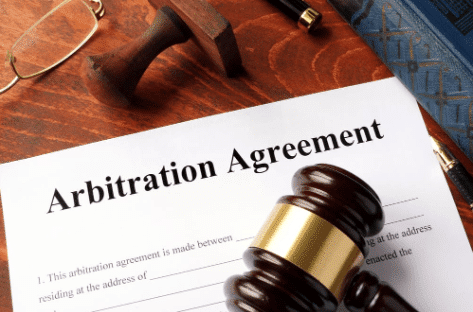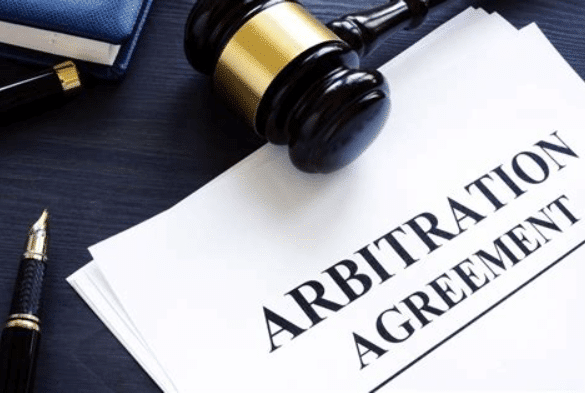If you have a credit card or loan debt like most Americans, it’s vital to understand your rights and those of your creditors. Many credit contracts contain provisions for binding mandatory arbitration. Learn what credit card arbitration is with the help of ZumaZip.com
If you’ve encountered a dispute with a creditor, you may have encountered mandatory arbitration, an alternative dispute resolution method that bypasses traditional legal trials. While either party, creditor or debtor, can trigger mandatory arbitration, both typically seek to avoid it due to its associated costs.
In mandatory arbitration proceedings, the initiating party engages a neutral third party to arbitrate the dispute resolution. For example, a creditor may enlist a third-party arbiter to assess a debtor’s history of non-payment and issue a ruling in their favor, potentially resulting in a judgment enabling the collection of owed funds.
Alternatively, debtors can also instigate mandatory arbitration against creditors, though such actions are less common unless substantiated by valid reasons.
Make a Motion to Compel Arbitration.
Our Motion to Compel Arbitration is the best way to beat a credit card debt lawsuit. Many debt collectors will simply give up after receiving it.
Why credit card companies opt for arbitration
Credit card companies typically opt for court proceedings over arbitration unless there are compelling financial incentives to pursue the latter. Arbitration processes tend to incur higher costs compared to litigation in court, making a Complaint from a creditor a more common occurrence than a motion to arbitrate.
However, a notable exception arises when substantial debts are involved. In cases where a debtor owes a considerable sum, such as $50,000 in credit card debt, creditors may choose arbitration despite the higher expenses, as it offers a potentially stronger position to uphold their claim.
Court cases afford debtors the opportunity to present arguments and enlist legal representation, potentially resulting in judgments unfavorable to creditors and significant financial losses. Conversely, arbitration proceedings tend to favor creditors, as evidenced by public arbitration data from California, suggesting similar outcomes across other states.
Importantly, the outcome of an arbitration claim typically cannot be appealed unless significant grounds, such as fraud or a conflict of interest involving the arbiter, are present. Minor disputes regarding debt amounts or repayment histories do not suffice as grounds for appeal; instead, substantive issues necessitating a reassessment of the arbitration process are required.
When you should consider arbitration
Arbitration can present an advantageous option in cases where the debt amount is relatively low. For example, if an individual owes $500 to a credit card company and pursues arbitration through a Motion to Compel Arbitration, the creditor might opt to concede the case due to the considerable expense associated with arbitration proceedings. The costs of arbitration arrangements can amount to thousands of dollars, exceeding the outstanding debt.
However, it is essential to temper expectations, as the final determination of whether arbitration is suitable rests with the judge. Thus, initiating arbitration requires a substantiated rationale, as evading debt repayment does not constitute a valid basis for pursuing this course of action.
For more context, consider the following example.
Example: Melissa, a debtor to Retail Cards for You with a $1,000 outstanding balance, sought recourse through arbitration due to financial constraints hindering her ability to fulfill payments. In pursuit of debt resolution, she initiated legal proceedings by filing a Motion to Compel Arbitration with her local jurisdiction. Upon thorough evaluation, the presiding judge deemed her claim lacking in merit, resulting in its dismissal. Consequently, Melissa incurred financial loss from associated legal expenses without alleviating her debt obligation to Retail Cards for You, which remains at $1,000.
Check out the following video to learn more about how arbitration can help you.
There are two arbitration groups common to creditors: JAMS and AAA
The two main arbitration groups are Judicial Arbitration and Mediation Services, Inc. (JAMS) and American Arbitration Association (AAA).
JAMS and AAA represent two distinct arbitration entities with differing fee structures and implications for parties involved in disputes. JAMS, established earlier, imposes fees on the initiator for its services, whereas AAA, a newer alternative, tends to favor creditors due to its cost-effectiveness. Notably, AAA reports that nearly half of all cases incur no arbitration fees, enhancing its appeal to creditors seeking efficient resolution methods.
Following the emergence of AAA, many creditors opted to amend their agreements, granting consumers the option to select between JAMS and AAA for arbitration proceedings. In most scenarios, it is advisable to stipulate JAMS for third-party arbitration in agreements with creditors. By doing so, creditors are burdened with fees that may render further pursuit of the case financially inefficient, potentially tilting the resolution process in favor of the debtor.
How does a Motion to Compel Arbitration work?
The majority of individuals prefer to address their debts directly by either paying them off or negotiating settlements with creditors, rather than resorting to arbitration. However, in cases where a creditor sells the debt to a collection agency, familiarizing oneself with the arbitration process becomes prudent, as it could potentially offer advantages in specific circumstances.
Upon receiving notice that your account is with a debt collection agency, ask them to validate the debt. If you can afford it, settle the debt or set up a repayment plan. If you can’t, be aware that the debt collection agency may initiate a lawsuit against you.
In the event of a legal claim filed by a creditor or debt collection agency, it’s essential to respond by submitting an Answer to the local court. Alongside the Answer, include a Motion to Compel Arbitration, explicitly expressing a preference for resolution through JAMS and requesting the creditor to cover the arbitration fees upfront.
Upon judicial approval of arbitration, the creditor is obligated, as per the credit card agreement, to cover the costs of arbitration. Opting for JAMS ensures that the creditor cannot select the cheaper alternative, AAA.
Subsequently, the creditor will weigh the cost of JAMS arbitration against the potential recovery of the debt before deciding on further action, including debt write-off.
It’s worth noting that the opportunity to select JAMS over AAA may not always be available, as some credit card agreements lack specific provisions regarding third-party arbitration. It is imperative to thoroughly review the terms of your credit card agreement before considering arbitration as a recourse.
Getting sued for debt? File a Motion to Compel Arbitration to avoid going to court.
It’s essential to understand your legal options with your creditors
It’s understandable that dispute resolution might not have been a primary concern when initially signing up for a credit card. Typically, individuals acquire credit cards with the intention of responsibly managing borrowed funds.
Nevertheless, it’s paramount to grasp your rights concerning credit cards to effectively navigate any potential disputes with your lender. This understanding ensures that you’re prepared for any eventualities that may arise in your financial interactions.
What happens in arbitration?
Here are some valuable insights on arbitration from a debt lawyer:
- Motion to Compel Arbitration: Initiating a Motion to Compel Arbitration facilitates the transfer of a case from a traditional court setting to a private arbitration forum.
- Cost-Benefit Analysis: Arbitration can prove advantageous, particularly if the arbitration expenses for the creditor surpass the debt’s value, potentially resulting in the dismissal of a debt lawsuit.
- Cost Consideration: Arbitration can be costly, as arbitrator fees are typically shared between both parties involved.
- Informality of Process: While similar to a court trial, the arbitration process is generally less formal and does not involve a jury.
- Financial Threshold: For cases involving sums under $30,000, arbitration may be strategically advantageous, as the high costs involved could deter creditors from pursuing legal action.
- Contractual Terms: Understanding the terms outlined in the contract is crucial, as they dictate who bears the arbitration fees. If the contract assigns responsibility for these costs to the debtor, arbitration may not be the most favorable option.
- Strategic Intent: Demonstrating a clear intent to contest the case can incentivize creditors to explore settlement options outside of court.
- Self-Representation: Debtors possess the capability to negotiate debt settlements independently, provided they possess a comprehensive understanding of their case.
These tips provide a useful framework for navigating the arbitration process and making informed decisions in debt-related legal matters.
What is ZumaZip?
ZumaZip is a convenient solution designed to streamline your response to a debt collection lawsuit. Here’s a breakdown of what you can expect when you use ZumaZip:
Firstly, you’ll access our user-friendly web application, which guides you through the process step by step. You’ll be prompted to answer a series of questions related to your specific situation. Once you’ve completed the questionnaire, you have the option to either print out the finalized forms and mail them to the appropriate courts yourself, or you can opt to utilize ZumaZip’s services to file them on your behalf. Additionally, if you choose this option, an attorney will review your document for added peace of mind.
If you’re seeking guidance on how to effectively respond to a debt collection lawsuit, ZumaZip can provide the assistance you need. Feel free to explore our FAQs for more information on what ZumaZip has to offer.
What if I haven’t been sued yet?
If you’ve only received a collections notice, but not a lawsuit, the best way to respond is with a Debt Validation Letter. When a debt collector contacts you in any way, whether it’s by phone or mail, you can respond by formally requesting a debt validation with a Debt Validation Letter . This letter notifies the collector that you dispute the debt and forces them to provide proof you owe the debt. They can’t call you or continue collecting until they provide validation of the debt. This flowchart shows how you can use a Debt Validation Letter to win.
Get started with a Debt Validation Letter here.
How to Answer a Summons for debt collection in all 50 states
Here’s a list of guides on how to respond to a debt collection lawsuit in each state:
- Alabama
- Alaska
- Arizona
- Arkansas
- California
- Colorado
- Connecticut
- Delaware
- Florida
- Georgia
- Hawaii
- Idaho
- Illinois
- Indiana
- Iowa
- Kansas
- Kentucky
- Louisiana
- Maine
- Maryland
- Massachusetts
- Michigan
- Minnesota
- Mississippi
- Missouri
- Montana
- Nebraska
- Nevada
- New Hampshire
- New Jersey
- New Mexico
- New York
- North Carolina
- North Dakota
- Ohio
- Oklahoma
- Oregon
- Pennsylvania
- Rhode Island
- South Carolina
- South Dakota
- Tennessee
- Texas
- Utah
- Vermont; Vermont (Small Claims court)
- Virginia
- Washington
- West Virginia
- Wisconsin
- Wyoming
Guides on how to beat every debt collector
Hey there! Facing off against a debt collector can feel like a daunting challenge, but fear not! We’re here to help you navigate through it all with our handy guides designed to assist you in beating every debt collector you encounter. Whether you’re facing a new lawsuit or dealing with a persistent collector, we’ve got your back. Stay positive, stay informed, and let’s tackle this together!
- Absolute Resolutions Investments LLC
- Accredited Collection Services
- Alliance One
- Amcol Clmbia
- American Recovery Service
- Asset Acceptance LLC
- Asset Recovery Solutions
- Associated Credit Services
- Autovest LLC
- Cach LLC
- Cavalry SPV I LLC
- Cerastes LLC
- Colinfobur
- Covington Credit
- Crown Asset Management
- CTC Debt Collector
- Cypress Financial Recoveries
- Delanor Kemper & Associates
- Eagle Loan of Ohio
- Educap
- Estate Information Services
- FIA Card Services
- Forster & Garbus
- Freshview Solutions
- Fulton Friedman & Gullace LLP
- Harvest Credit Management
- Howard Lee Schiff
- Hudson & Keyse LLC
- Integras Capital Recovery LLC
- Javitch Block
- Jefferson Capital Systems LLC
- LVNV Funding
- Mannbracken
- Mariner Finance
- Medicredit
- Michael J Adams PC
- Michael J Scott
- Midland Funding LLC
- Mullooly, Jeffrey, Rooney & Flynn
- Mountain Land Collections
- MRS Associates
- National Collegiate Trust
- Nationstar Foreclosure
- Northstar Capital Acquisition
- NCEP LLC
- NRC Collection Agency
- OneMain Financial
- Palisades Collection LLC
- Pallida LLC
- Paragon Revenue Group
- Pinnacle Collections Agency
- PMAB LLC
- Portfolio Recovery Associates
- Provest Law
- PYOD LLC
- Reunion Student Loan Finance Corporation
- Revenue Group
- Regents and Associates
- RSIEH
- Salander Enterprises LLC
- Second Round Sub LLC
- Security Credit Services
- Sherman Financial Group
- Suttell and Hammer
- T-Mobile
- Transworld Systems
- Tulsa Teachers Credit Union
- UCB Collection
- Velo Law Office
- Velocity Investments
- Waypoint Resource Group
- Weinberg and Associates
- Wolpoff & Abramson
Settle your medical debt
Having a health challenge is stressful, but dealing medical debt on top of it is overwhelming. Here are some resources on how to manage medical debt.
- Am I Responsible for My Spouse’s Medical Debt?
- Do I Need a Lawyer for Medical Bills?
- Do I Need a Lawyer to Fight Medical Bill Debt?
- Does Bankruptcy Clear Medical Debt?
- How Much Do Collection Agencies Pay for Medical Debt?
- How to Find Medical Debt Forgiveness Programs
- Is There a Statute of Limitations on Medical Bills?
- Medical Debt Statute of Limitations by State
- Summoned to Court for Medical Bills — What Do I Do?
- Summoned to Court for Medical Bills? What to Do Next
Stop calls from Debt Collectors
Do you keep getting calls from an unknown number, only to realize that it’s a debt collector on the other line? If you’ve been called by any of the following numbers, chances are you have collectors coming after you, and we’ll tell you how to stop them.
- 800-390-7584
- 800-289-8004
- 800-955-6600
- 877-366-0169
- 877-591-0747
- 800-278-2420
- 800-604-0064
- 800-846-6406
- 877-317-0948
- 888-899-4332
- 888-912-7925
- 202-367-9070
- 502-267-7522
Other wage garnishment resources
- Bank Account Garnishment and Liens in Texas
- Can I Stop Wage Garnishment?
- Can My Wife’s Bank Account Be Garnished for My Debt?
- Can Payday Loans Garnish Your Wages?
- Can pensions be garnished?
- Can Private Disability Payments Be Garnished?
- Can Social Security Disability Be Garnished?
- Can They Garnish Your Wages for Credit Card Debt?
- Can You Stop a Garnishment Once It Starts?
- Guide to Garnishment Limits by State
- How Can I Stop Wage Garnishments Immediately?
- How Long Before a Creditor Can Garnish Wages?
- How Long Does It Take to Get Garnished Wages Back?
- How to Fight a Wage Garnishment
- How to Prevent Wage Garnishment
- How to Stop a Garnishment
- How to Stop Social Security Wage Garnishment
- How to Stop Wage Garnishment — Everything You Need to Know
- New York Garnishment Laws – Overview
- Ohio Garnishment Laws — What They Say
- Wage Garnishment Lawyer
- What Is Wage Garnishment?
Guides on Arbitration
If the thought of going to court stresses you out, you’re not alone. Many Americans who are sued for credit card debt utilize a Motion to Compel Arbitration to push their case out of court and into arbitration.
Below are some resources on how to use an arbitration clause to your advantage and win a debt lawsuit.
- How Arbitration Works
- How to Find an Arbitration Clause in Your Credit Agreement
- How to Make a Motion to Compel Arbitration
- How to Make a Motion to Compel Arbitration in Florida
- How to Make a Motion to Compel Arbitration Without an Attorney
- How Credit Card Arbitration Works
- Motion to Compel Arbitration in California
- Sample Motion to Compel Arbitration
Federal Debt Collection Laws Can Protect You
Knowing your rights makes it easier to stand up for your rights. Below, we’ve compiled all our articles on federal debt collection laws that protect you from unfair practices.
- 15 USC 1692 Explained
- Does the Fair Credit Reporting Act Work in Florida?
- FDCPA Violations List
- How to File an FDCPA Complaint Against Your Debt Collector (Ultimate Guide)
- How to Make a Fair Debt Collection Practices Act Demand Letter
- How to Submit a Transunion Dispute
- How to Submit an Equifax Dispute
- How to Submit an Experian Dispute
- What Debt Collectors Cannot Do — FDCPA Explained
- What Does Account Information Disputed by Consumer Meets FCRA Requirements Mean?
- What does “meets FCRA requirements” mean?
- What does FCRA stand for?
- What is the Consumer Credit Protection Act
Resolve Your Debt with Your Creditor
Some creditors, banks, and lenders have an internal collections department. If they come after you for a debt, ZumaZip can still help you respond and resolve the debt. Here’s a list of guides on how to resolve debt with different creditors.
- American Express; American Express – Debt Collection
- Bank of America
- Barclay
- Best Buy Credit Card
- Capital One
- Chase
- Credit One Bank
- Old Navy Credit Card
- PayPal Synchrony Card
- Regional Finance
- Retailers National Bank
- Reunion Student Loan Finance Corporation
- SYNCB/PPEXTR
- Synchrony Bank
- Synchrony Walmart Card
- Target National Bank
- Webbank
- Wells Fargo
- Can I Pay My Original Creditor Instead of a Debt Collection Agency?
- Can I Settle a Debt with the Original Creditor?
Check the Status of Your Court Case
Don’t have time to go to your local courthouse to check the status of your case? We’ve created a guide on how to check the status of your case in every state, complete with online search tools and court directories.
- Alabama Court Case Search—Find Your Lawsuit
- Alaska Court Case Search — Find Your Lawsuit
- Arizona Court Case Search – Find Your Lawsuit
- Arkansas Court Case Search — Find Your Lawsuit
- California Court Case Search- Find Your Lawsuit
- Colorado Court Case Search — Find Your Lawsuit
- Connecticut Case Lookup — Find Your Court Case
- Delaware Court Case Search — Find Your Lawsuit
- Florida Court Case Search — Find Your Lawsuit
- Georgia Court Case Search — Find Your Lawsuit
- Hawaii Court Case Search — Find Your Lawsuit
- Idaho Court Case Search – Find Your Lawsuit
- Illinois Court Case Search — Find Your Lawsuit
- Indiana Court Case Search — Find Your Lawsuit
- Iowa Court Case Search — Find Your Lawsuit
- Kansas Court Case Search — Find Your Lawsuit
- Kentucky Court Case Search — Find Your Lawsuit
- Louisiana Court Case Search — Find Your Lawsuit
- Maine Court Case Search — Find Your Lawsuit
- Maryland Court Case Search — Find Your Lawsuit
- Massachusetts Court Case Search — Find Your Lawsuit
- Michigan Court Case Search — Find Your Lawsuit
- Minnesota Court Case Search — Find Your Lawsuit
- Mississippi Court Case Search — Find Your Lawsuit
- Missouri Court Case Search — Find Your Lawsuit
- Montana Court Case Search — Find Your Lawsuit
- Nebraska Court Case Search — Find Your Lawsuit
- Nevada Court Case Search — Find Your Lawsuit
- New Hampshire Court Case Search — Find Your Lawsuit
- New Jersey Court Case Search—Find Your Lawsuit
- New Mexico Court Case Search – Find Your Lawsuit
- New York Case Search — Find Your Lawsuit
- North Carolina Court Case Search — Find Your Lawsuit
- North Dakota Court Case Search — Find Your Lawsuit
- Ohio Court Case Search — Find Your Lawsuit
- Oklahoma Court Case Search — Find Your Lawsuit
- Oregon Court Case Search — Find Your Lawsuit
- Pennsylvania Court Case Search — Find Your Lawsuit
- Rhode Island Court Case Search — Find Your Lawsuit
- South Carolina Court Case Search — Find Your Lawsuit
- South Dakota Court Case Search — Find Your Lawsuit
- Tennessee Court Case Search — Find Your Lawsuit
- Texas Court Case Search — Find Your Lawsuit
- Utah Court Case Search — Find Your Lawsuit
- Vermont Court Case Search — Find Your Lawsuit
- Virginia Court Case Search — Find Your Lawsuit
- Washington Court Case Search — Find Your Lawsuit
- West Virginia Court Case Search — Find Your Lawsuit
- Wisconsin Court Case Search — Find Your Lawsuit
- Wyoming Court Case Search — Find Your Lawsuit






























